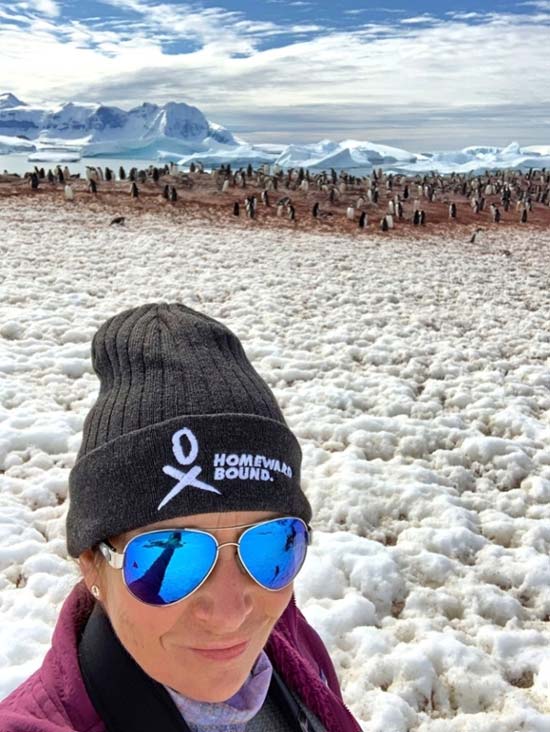Taking 'Farmers Fight' to a New Frontier: Q&A With Michele Finn ’88
January 17, 2020
Tweet
By Andréa Bolt
Michele Finn ‘88 just returned from an adventure in Antarctica with one hundred of her newest friends who specialize in science, technology, engineering and mathematics or medicine (STEMM) as part of Homeward Bound, a global leadership initiative with the goal of heightening the influence and impact of women in making decisions that shape the planet.
Finn, who studied marine biology at Texas A&M University at Galveston, brought her extensive background and knowledge in environmental management and conservation to the cohort: she has served as a ship officer, worked as a diver, a pilot, a biologist with Monterey Bay National Marine Sanctuary, National Ocean Service and with the NOAA Gulf of Mexico Disaster Response Center.
We asked her some questions about her recent expedition to Antarctica with Homeward Bound and how her time as an Aggie by the Sea has aided her in her career accomplishments and how being an Aggie has opened doors along the way.
Q: Do any particular Aggie by the Sea classes, professors or other experiences stand out?
“I fondly remember several A&M-Galveston professors. My favorite class was Genetics with Dr. Schwartz. The material was interesting and Dr. Schwartz was both a good instructor and a really good man. The iconic Dr. Harper and Invertebrate Zoology is probably on every Marine Biology graduate’s list of impactful experiences. Dr. Harper tried to come across as tough, but it was obvious to me he cared deeply about challenging each of us to reach our potential. Both Dr. Schwartz and Dr. Harper wrote letters of support for my graduate school application. And Dr. Schlemmer! He is my all-time favorite professor. I took his one-hour seminar early in my career and earned a longtime advocate and mentor. Dr. Schlemmer influenced my mentoring style. I strive to find joy and inspiration from my mentoring relationships because of him.”
Q: How did A&M-Galveston prepare and/or lead toward what you've accomplished in your career and what you're doing now?
“Besides the access and ongoing relationships with A&M-Galveston faculty and staff well after graduation, I think the field work and extracurricular activities were an added advantage. We didn’t have the amazing options available to students today. I’m fairly certain my time as a student worker on a Texas Clipper summer cruise made me an interesting candidate for the NOAA Commissioned Officer Corps. And the Texas A&M Former Student Network has absolutely given me an edge in multiple situations throughout and after my NOAA career.”

Q: How did you become involved with Homeward Bound?
“After retiring from my first career (NOAA Corps), I was struggling to find my place in a second career. I couldn’t find a position along the central Gulf Coast that really used me for my experience, allowed continual learning and enabled me to make a positive difference. I became an independent consultant, which opened up opportunities, but I still struggled. The universe aligned and allowed me to spend time with a previous junior officer, CDR Rebecca Waddington, who participated in the second group of Homeward Bound women. She encouraged me to apply and provided guidance throughout the application process.”
Q: What has your Homeward Bound experience been like?
“Exploring Antarctica with over 100 highly accomplished, motivated and compassionate women was a once-in-a-lifetime experience. Antarctica is awe-inspiring. It’s the last place on this planet close to being pristine. Learning more about [the continent’s] history, geology, biodiversity and conservation efforts has motivated me to become actively engaged in protecting it. Because the governments of the different countries on our planet have come together and are committed to its protection; I am ready to believe in the possibility to do better for the natural environment of my own home and the many other places I love. And I now belong to a diverse network of people who are already moving forward with environmental conservation and social justice action. Ideas seem possible.”
Q: Do you feel programs like this are important to foster more STEMM growth and learning, especially in women?
“I believe programs fostering diversity in STEMM are incredibly important. I feel like the more the culture of a work environment embodies inclusion, acceptance and appreciation for differences, the more joy and less stress people experience in that place. We spend so much of our lives at work; we should all really want to be there. And advancement in STEMM requires innovation. Innovation requires different perspectives, thought patterns, communication styles, life experiences, etc. Diversity is the key to excellence in innovation.”
Q: What are the impacts of the Homeward Bound program?
“The immediate impact of the program for me has been the acquisition of the network. I’ve had to explain to family, friends and colleagues that I’m “not done” and that I still have more I want to do in my professional life. Those explanations have largely fallen on deaf ears - but not with the women of Homeward Bound. With this group, I am not a washed-up has-been who had a good run. I’m seen as someone who can provide value to environmental science and policy initiatives. I’m motivated. I saw the transformation of every other woman. Some need similar motivation. Some needed a motivation or encouragement on other fronts. These are women who are powerful on their own. Imagine how much stronger we are together.”
Q: What advice would you give to current marine biology students looking to go down the same road you have?
“Academics are important. Obtaining undergraduate and advanced degrees, additional certifications and experience is important. But, take advantage of making AND keeping deep connections with the people you encounter along the way. Individually, you may be spectacular. With quality people all around you, you can really make this world a better place...you can't do that alone."
###
Media contact:Marketing and Communications
a_bolt@tamug.edu
409.740.4929
More:
Read more about Health & Environment
Read more about Marine Biology
Read more about Marine Sciences